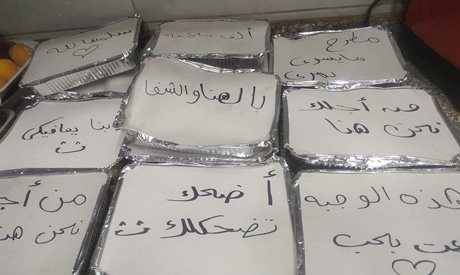
Civil initiatives providing healthy food
Over the past week several initiatives aimed at helping patients receiving coronavirus treatment at home are providing healthy meals.
“No thanks... my niece and my friends brought me food already. If you don’t mind, could you bring me salad,” Gigi, from Mohandessin, a well-off district in Giza, asked her neighbour when she offered to cook her lunch.
Gigi was lucky because as the coronavirus began spreading some patients became stigmatised and treated coldly by their neighbours for fear of contagion.
Leaving nothing to chance and to ensure that these patients eat quality food much needed for their immune system, Basma Mustafa, an investigative journalist, decided to cook meals for Covid-19 patients. Mustafa told Al-Ahram Weekly that she loves to cook because it helps raise her positive energy, so she decided to put that passion to good use and “to rescue a soul”. She launched a public group on Facebook and in less than 10 days almost 20,000 volunteers had joined. An average of 200 meals could be delivered a day, she said.
Somaya Al-Assyouti, who owns a downtown restaurant, joined the group to donate vegetables, fruits, disposable food boxes, juice and honey. She also volunteered cooking lunch in her restaurant. Together with her assistant they start cooking at 12pm and all the meals are ready for delivery by 3pm, Al-Assyouti said. She says cooking with good vibes reflects love. “This love is reflected in the taste of food. What is done with love reaches hearts directly,” Al-Assyouti told the Weekly.
For Mustafa, people may think that cooking many meals is the difficult part but she says the hardest part in the daily work is coordinating between volunteers buying the materials, cooking, and delivering the meals.
According to Al-Assyouti, volunteers fill out a few questions including their location “to make it easier for every district to cook for its residents”. No money is collected from volunteers, she said.
“I feel that whatever happens, I won’t be alone,” Mustafa said after seeing the demand and goodwill by volunteers.
Al-Assyouti agreed. “The goodness, purity and support seen in this initiative exceeds my expectations. Egyptians proved to be good people and the exception is a minority.”
She said people are aware of what healthy nutrition should look like. “Sometimes we receive honey, nuts, apples, yoghurt and fresh juice as donations.”
Many are enthusiastic to participate in the project and the page receives numerous applications from various governorates. “Up until now we have been delivering healthy meals to Cairo and Giza but as we organise the applications of volunteers according to districts, we will be able to include other governorates,” Mustafa said.
“We also invite big restaurants and delivery companies to participate.”
Already a restaurant in Alexandria is giving discounts and a healthy menu for Covid-19 patients. A restaurant that makes koshari — made of rice, macaroni and lentils — offered free meals to patients quarantined in Helwan University.
Along the same lines Ahmed Mido, 28, a graduate of the Faculty of Tourism and Hotels, had a similar idea to do the same from his home. What prompted him was that some restaurants were refusing to deliver food to a Covid-19 patient near Faisal Street. Mido read the patient’s post and started cooking meals and delivering them to the patient for free.
“The patient was very happy. So I posted the story and asked if anyone can help with this effort or in the kitchen. The post received more than 300 shares and comments,” Mido told the Weekly.
He thought about writing a message on the cover of food boxes: “we love you and hope you recover”. Then he asked people on his page to write messages to the patients that he would then write on the boxes every day. “I received 8,200 messages of support,” he said, adding that the number of meals increased from around 50 a day to 300 by the end of last week.
He agrees with Mustafa that the hardest thing is coordination and networking.
Mido asks a patient beforehand to send the results of tests that prove he or she has Covid-19 and, after that, provides them with a meal for 14 days. “I want to make sure food is delivered to those truly in need.”
Al-Assyouti cites another initiative: delivering medicine and oxygen tubes for free to patients’ homes on condition they have a physician’s prescription, as stipulated by the Esteshari (consultative) Association. They urge patients to return the tubes once they recover.
“The good thing,” Mido said, “is that the results of these initiatives is that a Covid-19 patient is no longer treated as a reject.”
*A version of this article appears in print in the 11 June, 2020 edition of Al-Ahram Weekly
Short link: